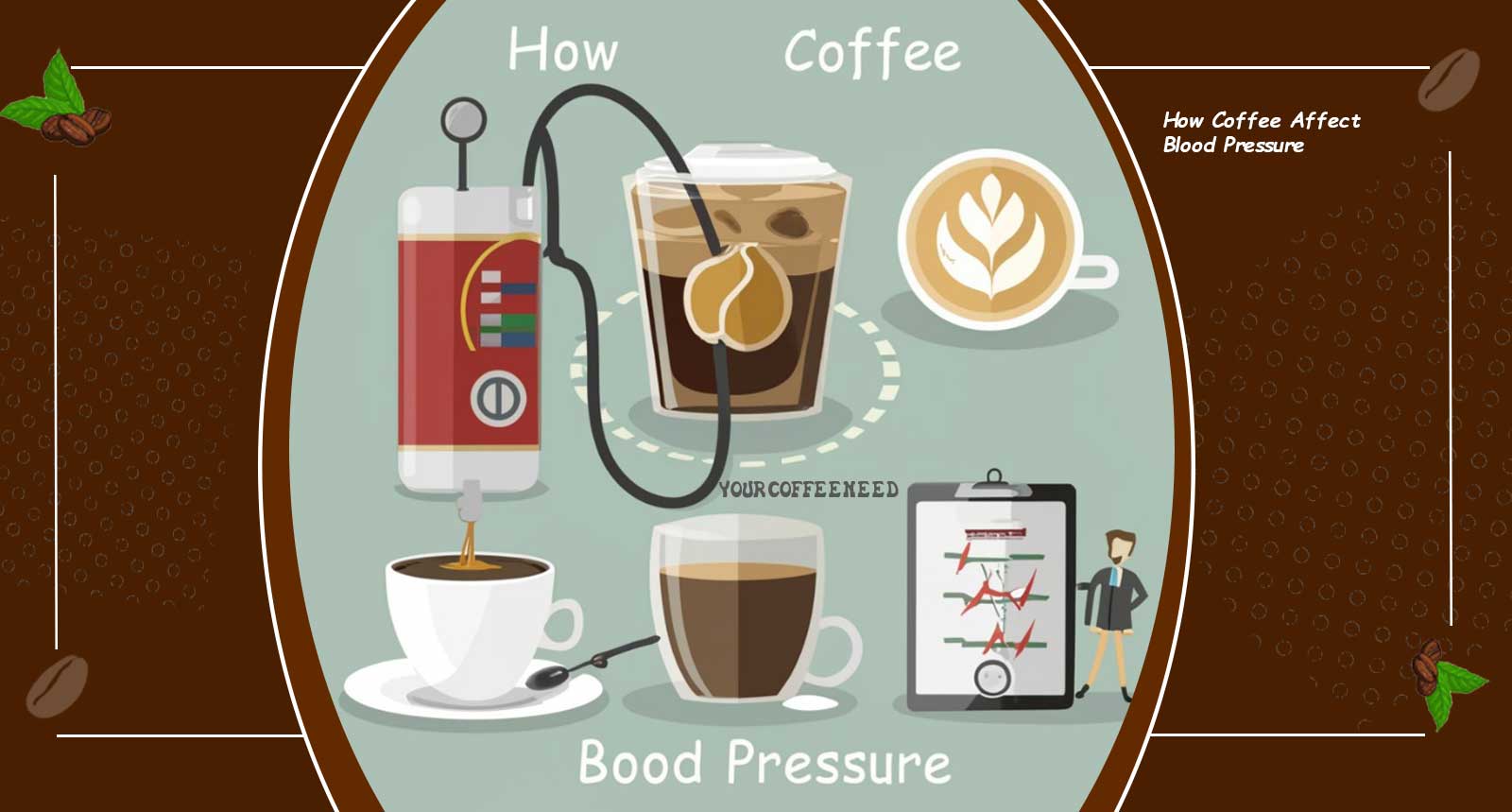How coffee affect blood pressure Coffee, a beloved morning ritual for many, holds more than just its invigorating aroma and bold taste. It also impacts blood pressure. The intricate interplay between your favorite brew and your cardiovascular health.
The nuances of how coffee influences blood pressure levels, the science behind this everyday indulgence. The mechanisms that underpin this relationship and gain insights into optimizing your coffee habits for a healthier lifestyle. The comprehensive guide to demystifying the impact of coffee on blood pressure.
Benefits of Coffee for Your Blood Pressure
Coffee, a beloved morning ritual for many, holds numerous benefits beyond its rich flavor and invigorating aroma. Here are ten ways moderate coffee consumption can positively impact your blood pressure and overall cardiovascular health.
Improved Vascular Function
Coffee contains antioxidants and bioactive compounds that promote healthy blood vessel function, contributing to optimal blood pressure levels.
Enhanced Arterial Health
Research suggests that coffee consumption may help maintain the elasticity of arterial walls, supporting efficient blood flow and reducing strain on the cardiovascular system.
Lowered Risk of Hypertension
Moderate coffee intake has been associated with a reduced risk of developing hypertension, a condition characterized by elevated blood pressure levels.
Antioxidant Protection
Coffee is rich in antioxidants, such as chlorogenic acid, which help combat oxidative stress and inflammation, potentially reducing the risk of hypertension related complications.
Stress Reduction
Enjoying a cup of coffee can promote relaxation and reduce stress levels, which may indirectly contribute to better blood pressure management.
Improved Endothelial Function
Coffee consumption has been linked to enhanced endothelial function, which plays a crucial role in regulating blood pressure and maintaining cardiovascular health.
Regulated Blood Sugar Levels
Some studies suggest that coffee may help regulate blood sugar levels, reducing the risk of insulin resistance and metabolic syndrome, conditions closely linked to hypertension.
Increased Nitric Oxide Production
Coffee stimulates the production of nitric oxide, a molecule that dilates blood vessels, improving blood flow and lowering blood pressure.
Reduced Risk of Stroke
Regular coffee drinkers may have a lower risk of stroke, a serious complication of hypertension, due to coffee’s beneficial effects on blood pressure and vascular health.
Promotion of Overall Heart Health
By supporting healthy blood pressure levels and reducing the risk of cardiovascular disease, moderate coffee consumption can contribute to overall heart health and longevity. While coffee can offer these potential benefits, moderation is key.
Excessive caffeine intake or high calorie coffee beverages laden with sugar and cream may negate these advantages and even have adverse effects on blood pressure. As always, consult with a healthcare professional for personalized guidance on coffee consumption and its impact on your health.
Disadvantages Of Coffee That Affect Your Blood Pressure
While coffee offers many benefits, excessive consumption or certain factors associated with coffee intake can negatively affect blood pressure and overall cardiovascular health. Here are ten disadvantages to consider.
Increased Heart Rate
The caffeine in coffee can lead to a temporary increase in heart rate, which may exacerbate existing cardiovascular conditions and elevate blood pressure.
Risk of Dehydration
Coffee is a diuretic, meaning it increases urine production and can lead to dehydration if not balanced with adequate hydration, potentially impacting blood pressure regulation.
Interference with Medications
Coffee can interact with certain medications used to manage blood pressure, reducing their effectiveness or increasing the risk of adverse effects.
Insomnia and Sleep Disturbances
Consuming coffee, especially in the afternoon or evening, can disrupt sleep patterns, leading to insufficient rest and potential exacerbation of blood pressure issues.
Anxiety and Jitters
Excessive caffeine consumption can trigger feelings of anxiety, nervousness and jitteriness, which may contribute to elevated blood pressure levels and worsen cardiovascular health.
Acid Reflux and Digestive Issues
Coffee can stimulate gastric acid production and exacerbate symptoms of acid reflux and digestive discomfort, which may indirectly affect blood pressure regulation.
Potential for Dependency
Regular coffee consumption can lead to caffeine dependence, where individuals may experience withdrawal symptoms, including headaches and irritability, when attempting to reduce or eliminate caffeine intake.
Increased Risk of Heart Palpitations
In sensitive individuals, high caffeine intake from coffee can cause heart palpitations, irregular heartbeats and feelings of discomfort, potentially impacting blood pressure stability.
Negative Impact on Blood Lipids
Some research suggests that unfiltered coffee consumption may elevate LDL cholesterol levels, which can contribute to cardiovascular risk factors and impact blood pressure regulation.
Potential for Increased Stress Response
In some individuals, the stimulatory effects of caffeine found in coffee may heighten the body’s stress response, leading to elevated cortisol levels and potential disruptions in blood pressure regulation.
While moderate coffee consumption is generally considered safe for most individuals, it’s important to be mindful of these potential disadvantages and consider personal health factors when incorporating coffee into your daily routine. Consulting with a healthcare professional can provide personalized guidance on coffee consumption and its impact on blood pressure and overall health.
Types of Coffee and How Coffee Affect Blood Pressure?
When it comes to coffee and its impact on blood pressure, the type of coffee you choose can play a significant role. Here are several types of coffee that may influence blood pressure levels.
Regular Coffee
Traditional brewed coffee contains varying levels of caffeine, which can affect blood pressure depending on individual sensitivity and consumption patterns.
Espresso
Espresso is a concentrated form of coffee that typically contains higher caffeine concentrations per ounce compared to regular brewed coffee, potentially leading to more pronounced effects on blood pressure.
Decaffeinated Coffee
While decaffeinated coffee contains significantly less caffeine than regular coffee, it may still exert some influence on blood pressure due to other bioactive compounds present in coffee beans.
Instant Coffee
Instant coffee is a convenient and quick alternative to brewed coffee, but it may contain higher levels of acrylamide, a compound formed during the roasting process, which could impact blood pressure regulation.
Cold Brew Coffee
Cold brew coffee is brewed with cold water over an extended period, resulting in a smoother, less acidic flavor profile. Its caffeine content may vary but can still affect blood pressure depending on consumption levels.
Flavored Coffee
Flavored coffees often contain added sugars, syrups or artificial flavorings, which can contribute to increased calorie intake and potential metabolic effects that may influence blood pressure.
Bulletproof Coffee
Bulletproof coffee is made by blending coffee with grass fed butter and medium chain triglyceride (MCT) oil, purportedly offering sustained energy and mental clarity. However, its high fat content and potential for increased caloric intake may impact cardiovascular health and blood pressure.
Organic and Fair Trade Coffee
Organic and fair trade coffee varieties are grown and sourced using environmentally sustainable and socially responsible practices. While the production methods may not directly impact blood pressure, choosing organic options may align with overall health conscious choices.
Single Origin Coffee
Single origin coffees are sourced from specific regions or plantations, offering unique flavor profiles influenced by terroir and cultivation practices. While the origin itself may not affect blood pressure, the overall quality and freshness of the coffee can impact its bioactive compound content.
Specialty Coffee Blends
Specialty coffee blends are crafted from a combination of beans to achieve specific flavor profiles and characteristics. While the blend composition may not directly influence blood pressure, factors such as roast level and bean quality can impact the coffee’s overall physiological effects.
Consideration of the type of coffee consumed, along with factors such as caffeine content, additives and brewing methods, can help individuals make informed choices regarding their coffee consumption and its potential impact on blood pressure and overall health.
Conclusion
In conclusion, understanding how coffee affects blood pressure is essential for making informed decisions about daily consumption. While moderate coffee intake may offer potential benefits such as improved vascular function and reduced risk of hypertension, it’s crucial to consider individual factors such as sensitivity to caffeine and overall health status.
By balancing coffee consumption with a healthy lifestyle and consulting with healthcare professionals as needed, individuals can optimize their cardiovascular health while enjoying their favorite brew. The intricate relationship between coffee and blood pressure to cultivate habits that promote wellness and vitality.

